OCENA WPŁYWU PROGRAMU „RODZINA 500+” NA POLSKĄ GOSPODARKĘ ZA POMOCĄ MODELU CGE
ASSESSMENT OF THE IMPACT OF THE ‘FAMILY 500+’ PROGRAMME ON THE POLISH ECONOMY USING THE CGE MODEL
Author(s): Rumiana GórskaSubject(s): National Economy, Economic policy, Family and social welfare, Socio-Economic Research
Published by: Uniwersytet Adama Mickiewicza
Keywords: CGE; ‘Family 500+’; household consumption; investments;
Summary/Abstract: The Polish government’s policy of financial support for families with children, known as ‘Family 500+’, has many supporters and opponents. The aim of the article is not to assess whether or not this policy is fair, but to analyse its effects on the economy using the Computable General Equilibrium (CGE) model. For the purposes of this study, a standard single country CGE model was constructed and calibrated using the GAMS software. The following conclusions can be drawn about the impact of the introduction of the ‘Family 500+’ Programme on the Polish economy. Social transfers will increase consumption, domestic production and imports. With the closure of the model assuming an increase in the budget deficit, these effects are stronger than under the closure assuming an increase in budget revenues. The impact on investments is negative. However, the simulation results depend on the capital block closure. With the neoclassical closure, it is assumed that investment adjusts to saving, so an increase in consumption is associated with a decrease in savings and hence a decrease in investment. With Keynesian closure, investment is not dependent on the level of savings, so an increase in government spending will not lead to a decline in investment.
Journal: Ruch Prawniczy, Ekonomiczny i Socjologiczny
- Issue Year: 82/2020
- Issue No: 3
- Page Range: 248-266
- Page Count: 18
- Language: Polish

